2015 山东省枣庄市中考英语真题及答案
注意事项
1. 本试卷分第卷和第 II 卷两部分;第 I 卷 1~5 页,为选择题,第 II 卷 6~ 8 页,为
非选择题,共 120 分。考试时间为 120 分钟。答卷前,在试卷第一页上 方空白处写上姓名
和准考证号。考试结束,将试卷和答题卡一并交回。
2. 回答第 I 卷所有题目时,都要在答题卡第 I 卷上把对应题目的答案标号(ABCD)涂黑;
回答第 II 卷所有题目时,都要在答题卡第 II 卷对应的题目横线上答题。
第 I 卷 (选择题 三部分共 55 分)
第一部分:听力(听力选择题,共 3 节小题,每小题 1 分,满分 I5 分;听力填空题 共
1 节,41~45 小题,每小题 2 分,满分 10 分)
第一节 听下面五段对话。每段对话后有一个题,从题中所给的 A、A、C 三个选项中
选出最佳答案,并标在试卷的相应位置。听完每段对话后,你将有 5 秒钟的时间来回答有
关 小题和阅读下一小题。每段对话读两遍。
1. What’s the subject Linda likes most?
A. Science.
B. Histoty.
C. Mith.
2. What did Lisa do on Saturday afternoon?
A. Went swimming.
B. Visited her grandma.
C. Stayed in a tent.
3. How are they celebrating their father’s birthday?
A. Inviting a classmate.
B. Making a cake.
C. Having a party.
4. Why didn't Anna answer her phone yesterday? Because ______.
A. she left her telephone at home
B. her telephone was gone
C. she didn't like to go to the meeting
5. Why shouldn't Laura get a job after leaving Junior High school? Because she
couldn’t ______.
A. get an education
B. play
C. be happy
CACBA
第二节 听下面一段对话,回答第 6~10 五个小题。现在你有 20 秒钟时间阅读这五个 小
题,该对话读两遍。
6. What’s the main idea of the dialogue?
A. The use of shoes.
B. The use of a scoop.
C. Three inventions.
7. What’s the first invention the woman introduces?
A. Shoes with special heels.
B. Shoes with lights.
C. A special ice-cream scoop.
8. How does the special ice-cream scoop run?
A. In an ice-cream.
B. On electricity.
C. In the water.
9. Are shoes with lights useful for walking at night?
A. No.
B. Yes.
C. Don’t know.
10. Why are shoes with special heels useful? Because the heels can ______ when
necessary.
A. be raised or lowered
B. go up
C. go down
CCBBA
第三节 听下面一段短文,回答第 11~15 五个小题。现在你有 20 秒钟时间阅读这五
�
个小题,该短文读两遍。
11. What’s the main idea of the passage?
A. Evening At Home.
B. Night At Home.
C. Afternoon At Home.
12. What’s the weather like in the passage?
A. Cold.
B. Hot.
C. Warm.
13. What kind of students do you think Harry and Kate are?
A. Impolite.
B. Hard-working.
C. Shy.
14. What do you think of their mother? She is ______.
A. not lazy and wastes things
B. lazy and saves things
C. not lazy and doesn’t waste things
15. What kind of home do you think the Browns have?
A. Painful.
B. Sad.
C. Happy.
AABCC
(请同学们翻到第 II 卷第四部分第一节,继续做听力填空題)
第二部分:英语知识运用(共两节,第一节 16~25 小题,每小题 1 分,满分 10 分;第
二节语法填空,46~55 小题,每小题 1 分,满分 10 分,共 20 分)
第一节 完型填空 阅读下面短文,掌握其大意,然后从 16~25 各题所给的四个选项
(ABCD)中,选出最佳选项。
A teacher had been made very angry by some of his boys making a high sound during
school hours. At last he was forced to
any one who should repeat the wrong
act. The next morning, a loud sound was heard in the quiet room. The students were
very much surprised, and the teacher at once looked around to
the person
who had made a high nound.
16
17
When a boy who was often in bad act, was told he was wrong, he
said he
hadn’t done it, yet his words were not believed, and he was brought up for punishment.
Seeing what was about to take place, Charles, a little boy, got up suddenly from
his
19 . “Don’t punish John, air. I made the high sound. I’m very sorry, I
didn't mean to whistle.” He held out his hand to be punished. Taking the little
boy’s
20 , the teacher said “ Charles, you have done right. I can't punish
you after you
22
of Charles, for every child could see how bravely he had acted.
so nobly.” Even the youngest child in the school felt
18
21
Charles was truly a brave boy. He had done
23
24
he knew to be right. True courage
bad people
25
C. fix
C. pay
D. hurt
D. wake
to do that which we know to be wrong,
B. praise
B. discover
B. aloud
B. board
B. arm
B. have run
B. proud
may also be shown by
may laugh at us,
16. A. punish
17. A. hide
18. A. actively
19. A. bag
20. A. hair
21. A. have given
22. A. afraid
23. A. what
24. A. refusing
25. A. but
ABCDD
第三部分
阅读下列短文,从 26~40 各题所给的四个选项(A B C D)中,选出最佳选项。
B. which
B. continuing
B. though
阅读理解(共 15 小题,每小题 2 分,满分 30 分)
C. who
C. dreaming
C. after
C. finger
C. have acted
C. sure
CBAAB
D. hand
D. have fallen
D. careful
D. when
D. wanting
D. until
C. strongly
C. desk
D. softly
D. seat
What could a poem writer and a movie director share? More than you think!
Langston Hughes began writing poems in high school and soon became one of America’
A
�
s greatest writers. Most of his writing is about his experiences as an African
American. He wrote poems about people who worked hard through life but still found
things to be happy about. He wrote plays and books about justice(正义) for all people,
and he wrote kids’ books, too. The Sweet and Sour Animal Book is a book of his
animal poems. Pictures and photos were used in the book. “Hold fast to dreams”
is a line in a famous Hughes poem. That’s exactly what he did throughout his life.
When Steven Spielberg was in middle school, he wanted to make a film. He had
an idea for a movie, but no money. He started a tree-planting business and made
his film with the money he earned. Spielberg never stopped making films, even after
many film schools refused him. Today he is one of the most popular and important
filmmakers in the world. His movies are about people who are adventurous(爱冒险
的), brave, kind. His characters often fight for what is good. Some of his films
are about his Jewish background, such as Schindler’s List. Spielberg once said,
“I don’t dream that much at night because I dream for a living.” In different
ways, both Hughes and Spielberg have encouraged people of all ages to reach for
their dreams.
26. What is the best title of the passage?
A. Two Men Who Were Afraid to Dream
B. Two Filmmakers Who Were Afraid to Dream
C. Two Writers Who Weren't Afraid to Dream
D. Two Men Who Weren't Afraid to Dream
27. When Langston Hughes became great he was ______ Steven Spielberg, who becomes
popular.
A. as old as
B. as young as
C. younger than
D. older than
28. Which of the following is Langston Hughes’ writing not about?
A. His experiences as an African American.
B. The fair treatment of animals.
C. Hard working and happy people.
D. The fair treatment of people.
29. What did Langston Hughes do in his whole life?
A. He never gave up his wish.
B. He sometimes had a wish to achieve.
C. He always had no wish to achieve.
D. He always wrote poems for movies.
30. Steven Spielberg’s movies are about the following except ______.
A. important people
C. friendly people
DCBAA
B. courageous people
D. his Jewish background
B
The long trunk of an elephant is a wonderful example of skill. The neck of
four-footed animals is usually long, to have them reach their food without
difficulty, but the elephant has a short neck, to make him more easily support the
weight of his huge head and heavy teeth. His long trunk lets him get his food easily.
The trunk of an elephant is to him what the neck is to other animals. It is
also a nose to him, for at the end of it there is a empty place like a cup, and
in the bottom of the cup are two holes, and the animal smells and breathes through
them. It is an arm and a hand too, so that it has been said that the elephant carries
his nose in his hand, and it might also have been said that he breathes by his hand.
At the end of the trunk, there is a strange part, about five inches long, which
forms a finger. With this finger the animal can pick up the smallest piece of money
from the ground, and he has been taught to make marks like letters with a pen.
�
The trunk of a full-grown elephant is about eight feet long. The elephant has
such great strength that he can knock down a man with it.
31. The elephant has a short neck to support ______.
A. his leg
B. his body
C. his arm
D. his head and
teeth
32. The trunk of the elephant helps him get his ______ easily.
A. side
B. tail
C. food
D. ear
33. The trunk of the elephant takes the place of the following except ______.
A. a neck
B. a nose and a fingsr
C. an arm and a hand
D. a
leg
34. How does the elephont smell? Through two holes ______.
A. in the bottom of the cup
C. in his head
B. at the beginning of the trunk
D. in his face
35. The elephant can knock down a man with his trunk. This shows that he is ______.
A. weak
DCDAB
B. strong
C. quiet
D. angry
C
When he was small, Hill was a famous bad boy.
At the age of 9, his father married his stepmother. At that time they lived
poor in the countryside while his stepmother was from a wealthy family.
His father introduced Hill to his stepmother as he said, “Dear, I hope you
notice in the entire shire this is the worst boy, who has made me have no other
way. Maybe before tomorrow morning he will throw a stone at you, or do a bad thing
you will never imagine.”
To Hill's surprise, his stepmother went up to him with a smile, held up his
head and looked at him carefully. She then turned around to tell her husband, “You’
re wrong. He is not the worst boy in the entire shire, but the cleverest and creative
boy. Only he doesn’t find a place to show himself. ”
His stepmother’s words warmed his heart, his eyes full of tears. With this,
he started building friendship with his stepmother. And this became the drive of
his life, making him create 28 successful golden rules, which helped tens of
thousands of ordinary people walk on the road to success.
Before his stepmother came, no one praised him smart, and his father and
neighbors considered him as a bad boy. However, his stepmother’s words changed
his life.
When Hill was 14 years old, his stepmother bought him a used typewriter and
said to him, “I believe you will become a writer.” Hill accepted his stepmother’
s gift and expectation, and started writing things to a local newspaper. He
understood his stepmother’s strong feeling of interest in his family while he saw
with his own eyes she had changed his family. Therefore, he would do as well as
she expected him to.
The strength from his stepmother made him a rich man and famous writer in the
United States and one of the most important persons in the 20th century.
Praise will never be unnecessary, especially for children. A sincere (真诚
的〉praise may be better than 10, 000 bad words.
36. What did people think of Hill before the age of nine?
A. Clever.
B. Creative.
C. Unfriendly.
D.
Foolish.
37. Hill started making friends with his stepmother after she ______.
A. smiled at him
C. said good words about him
B. looked at him carefully
D. said bad words about him
�
42
…junior high school is the
You’ll make
…many exciting things
…you have the
…go your
45
along the way, …
43
for you…
to make your…
44
ways now…
43. waiting
38. Which of the following is wrong about Hill?
A. He accepted his stepmother's typewriter.
B. He failed to do as he was expected.
C. He started writing to a local newspaper.
D. He understood his stepmother.
39. The writer is most probably an expert of______.
A. house building
B. diet
C. news writing
D. education
40. The passage was written mainly to tell us that ______.
A. children should be praised
C. Hill's stepmother wan kind to him
CCBDA
B. Hill’s father married again
D. Hill'S father was cruel to him
第 II 卷(非选择题 一部分 共 65 分)
第四部分:写作(共七节,满分 65 分)
第一节 听力填空题 (共 5 小题,每小题 2 分,满分 l0 分)
听下面一段短文,根据所听内容完成下面的表格(每空填—词)。现在你有 20 秒钟时间
阅读这五个小题。把答案写在答题卡第 II 卷第一节 41~45 小题的横线上。
41
of a new life …
42. mistakes
41. beginning
第二节语法填空(共 10 小题,每小题 1 分,满分 10 分)
阅读下面材料,把答案写在答题卡第 II 卷 46~55 小题横线上。有的答案要填入适当的
45. separate
44. ability
内容,有的答案要用括号内单词的正确形式,但每个答案不多于 3 个单词。
Some people still live in their hometown. However, others may only visit
once or twice a year. Millions of Chinese leave the countryside
for work in the cities. Among these is Hua Xing. He
the last 13 years. With a hard job
“I haven’t been back for three years. It’s
46
(search)
(live) in Wenzhou for
a factory, he seldom visits his hometown.
(shame),” he says.
47
48
49
50
52
51
(develop) have been good in Hua Xing’s hometown since 2002, for example,
new roads
(build). However, some things will
never change in his hometown. The big old tree is still beside the playground.
Children in his time
55
happy childhood.
(usual) liked to play together under it. It was
(appear). A new school
53
54
46. it
52. have appeared
47. to search
48. has lived
53. has been built
49. in 50. shameful 51. Developments
54. usually
55. such
第三节 阅读理解七选五(共 5 小题,毎小题 2 分,满分 10 分)
根据短文内容,从短文后的选项中选出能填入答题卡 56~60 小题最佳选项.
选项中有两项为多余选项。
“Have you finished your lesson, George?” Said Mr. Prentice to his son, who
had laid aside his book and was busy making a large paper kite.
“No, father,” replied George, hanging down his Head.
“ 56 ”
“Because it is so difficult, father, I’m not sure that I shall never learn
it.
57
. My memory is so bad.”
“If I were to promise you a holiday on the thirtieth of the month after next,
do you think you would forget the date?”
“ 58 ”
�
“You are good at skating, and flying your kite, and playing footballs, are
you not?” “Yes, father.”
“And you cannot learn your lesson! My dear boy, you are lying to yourself.
59 ” “But have I not tried, father?” again asked George.
“ 60 . Come, for this afternoon lay aside that kite you are making, and
give another effort to get your lesson ready. Be serious, and you will soon learn
it.”
A. No, I’m pretty sure that I should not.
B. You can learn as well as any one, if you will try.
C. It is easy.
D. Well, try again.
E. Besides(而且), I could not remember it after I had learned it.
F. If you don’t pay more attention to your lessons you will never be fit for anything.
G. Why not, my son?
56. G
58. A
57. E
59. B
60. D
第四节 单词拼写(共 5 小题,每小题 1 分,满分 5 分)
根据下列句中的汉语提示,写出所缺单词的正确形式,毎空一词。把答案写在答题卡
—That sounds __________(轻松).
61~65 小题的横线上。
61. —Let’s play music.
62. My mother is making ____________(味美的) soup.
63. My pet dog, three years old now, ___________(不喜欢) to stay alone.
64. After you argue with your parents you must
explain why you did that.
65. Don’t put your __________(胳膊肘)on the table.
61. relaxing
64. communicate
62. delicious
___________(交流)with them and
63. dislikes
65. elbows
第五节 汉译英(共 5 小题,每小题 2 分, 满分 10 分)
把答案写在答题卡 66~70 小题的横线上,必须用上所提供的单词或短语。
66. Jim 的姐姐正在打电话。(talk…phone).
66. Jim’s sister is talking on the phone.
67. 我喜欢熊猫,因为它们有点趣。(kind of)
67. I like pandas, because they are kind of interesting.
68. 你多长时间去看一次电影?(how often )
68. How often do you see a film?
69. 你能带我出去散散步吗?(could…please )
69. Could you please take me out for a walk?
70. 他过去常戴眼镜吗?(used to)
70. Did he use to wear glasses?
第六节
假定英语课上老师要求间桌之间交换修改作文,请你修改你同桌写的以下作文。文中
短文改错 (共 10 小题,每小题 1 分,满分 10 分)
共有 10 处语言错误。每句中最多有两处。错误仅涉及一个单词的增加、删除或修改。增加:
在缺词处加一个漏字符号^,并在其下面写出该增加的词。删除:把多余的词用(/)划掉。
修改:在错的词下画一横线,并在该词下面写出修改后的词。
注意:1. 每处错误及其修改均仅限一词,
2. 在答题卡的第六节的题上答题.
3. 只允许修改 10 处,多者(从第 11 处起)不计分.
Students these days often have a lot of worry. Sometimes they have problems
with
their schoolwork, and sometimes with their friends. How can they deal ^ these
problems?
worries
�
with
Laura Mills, the teenager from London, says,
a
“I think talking to someone help a lot. If we talk to someone, we’ll certainly
feel
better than we don't.”
helps
Laura once loses her wallet, and worried for days. She was afraid to tell her
parents
lost
about it for several days. In the end, she talked to her parents and we were really
they
understanding. They got her a new wallet and asked her to be most more careful.
“I will always remember ^ share my problems in the future!” Laura says.
to
Robert Hunt advises students about common problems. He thinks the first step
is to
find someone you trust to talk to. In English, we say that sharing a problem is
like cut it
cutting
in half. So you’re halfway to solve a problem just by talking to someone about
it.
第七节
把书面表达答案写在答题卡第七节的横线上。
书面表达(共 1 题,满分 10 分)
solving
Suppose(假设) You’re are Li Qianghua. Summer is coming. You are going to take part
in the activities of an international summer camp. Every member of the camp will
introduce himself/herself to other members on the first day. Write an introduction
of yourself in no more than 120 words according to the following points.
Where are you from?
Which grade are you in?
What kind of English textbook is used in your school?
What do you think of the textbook and why?
Why are you in the summer camp?
What do you like and why?
What is your dream?
How can you achieve it?
The beginning is ready. I’m Li Qianghua.
�
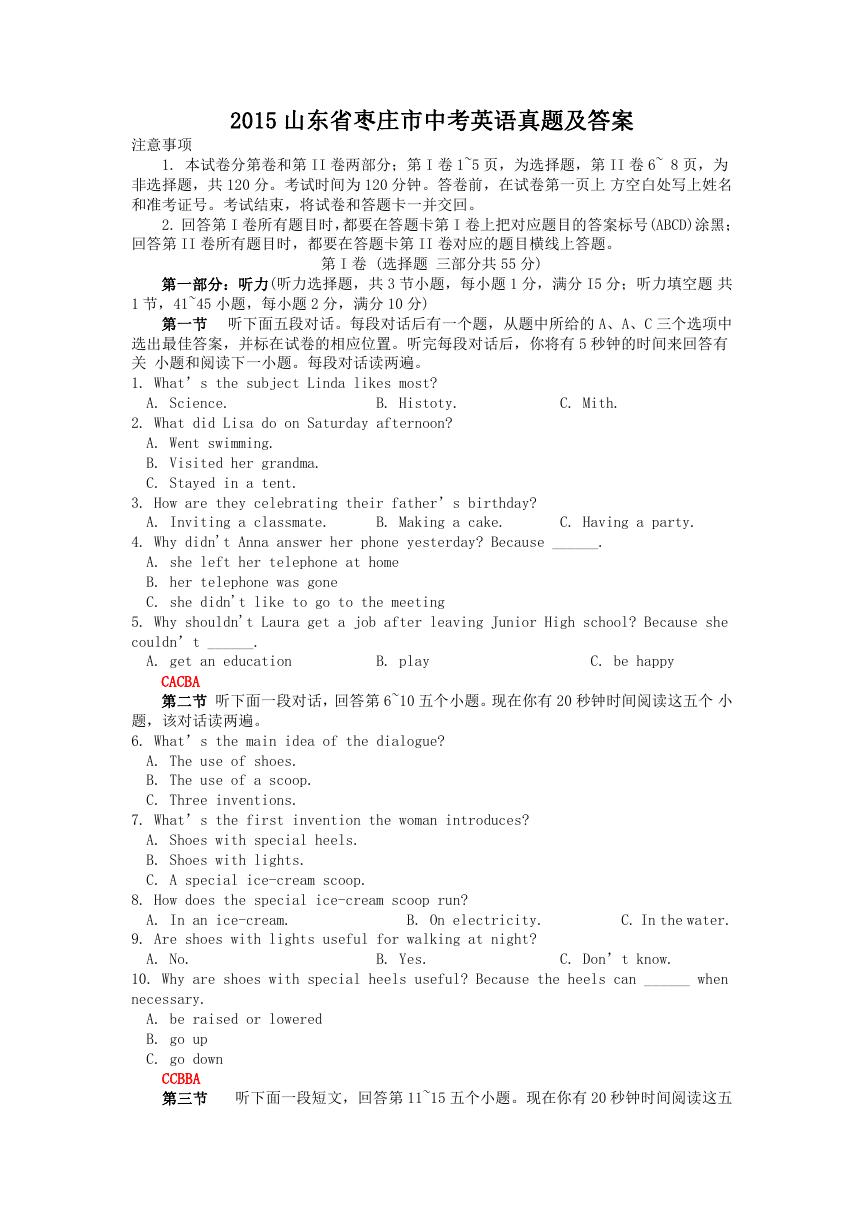
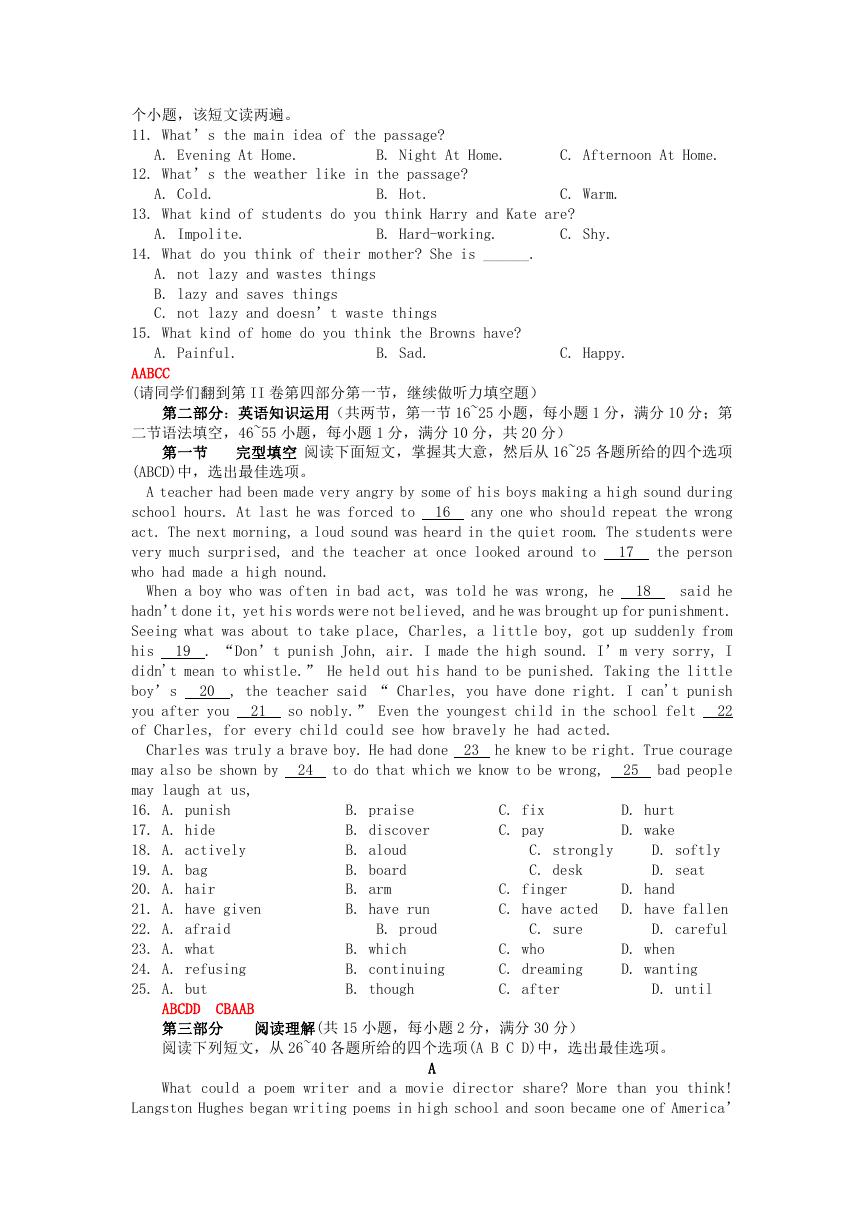
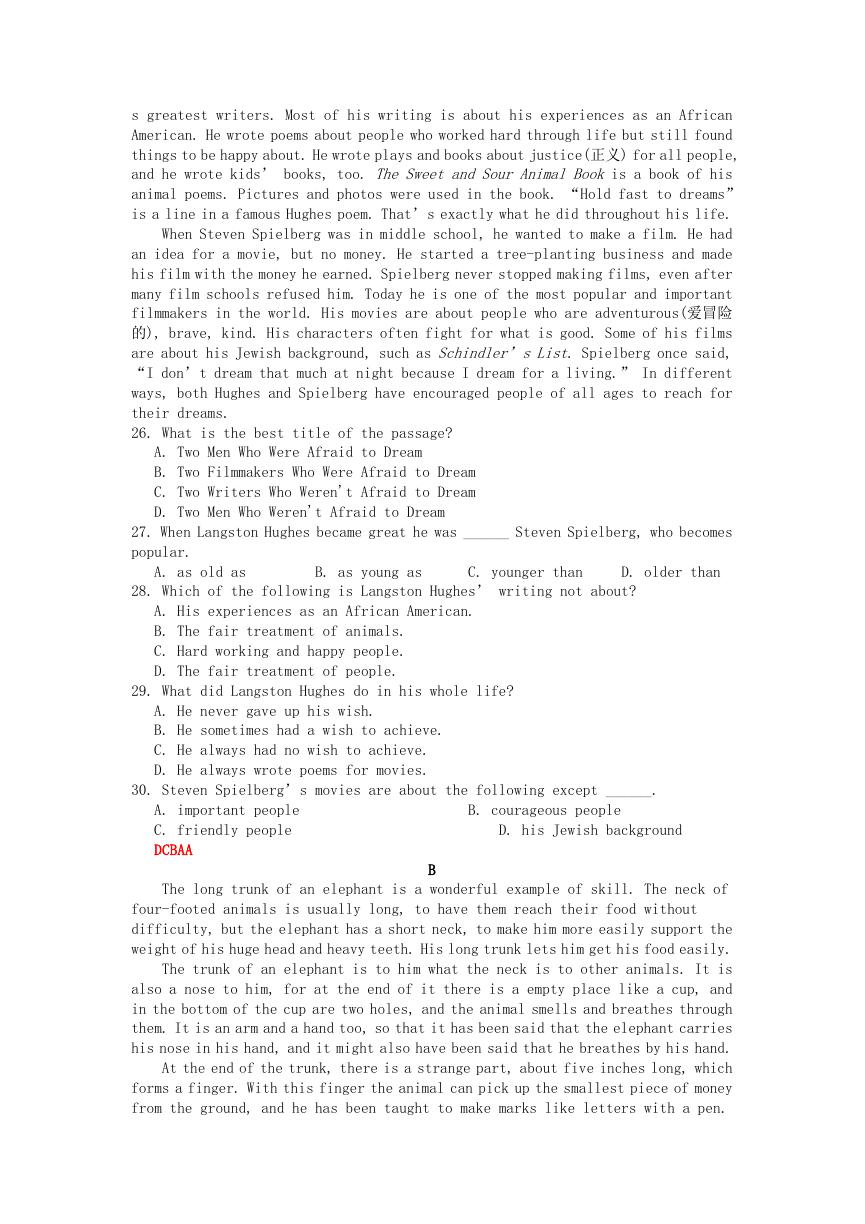
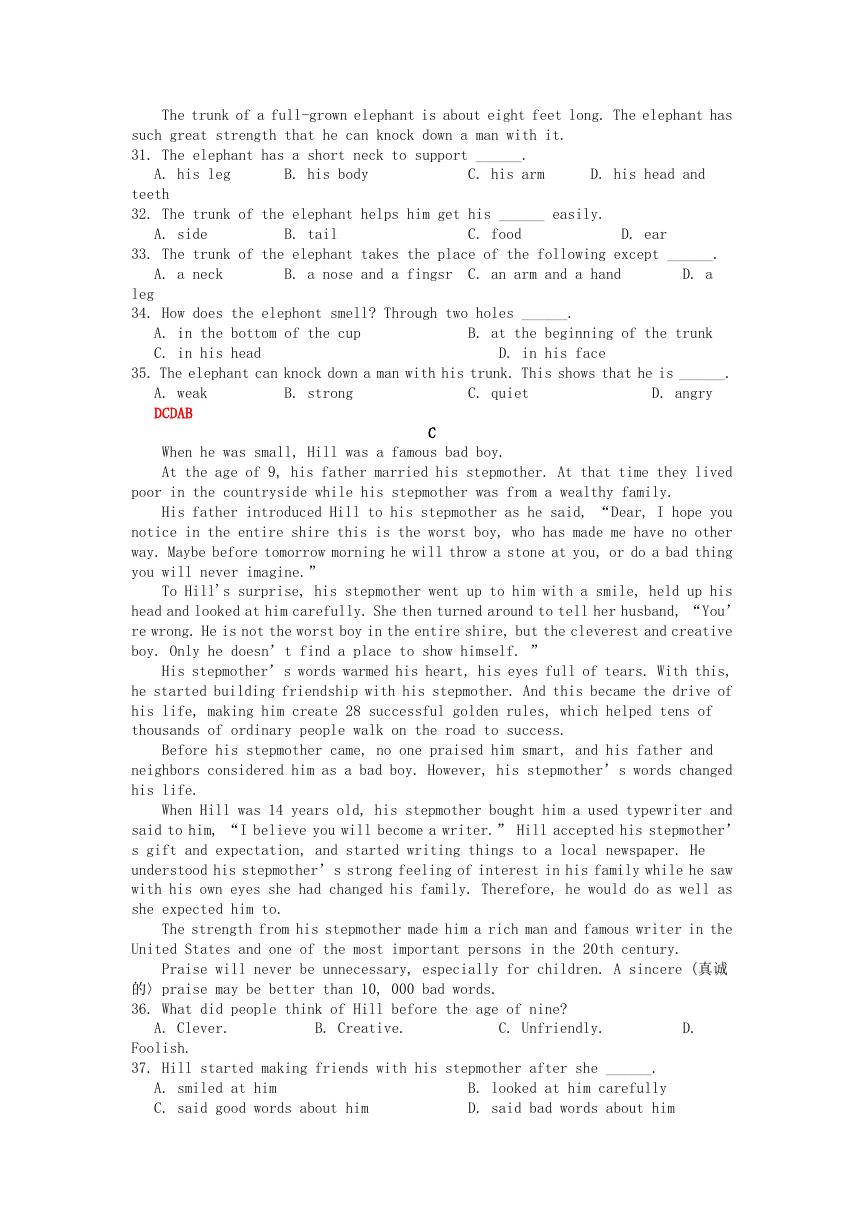
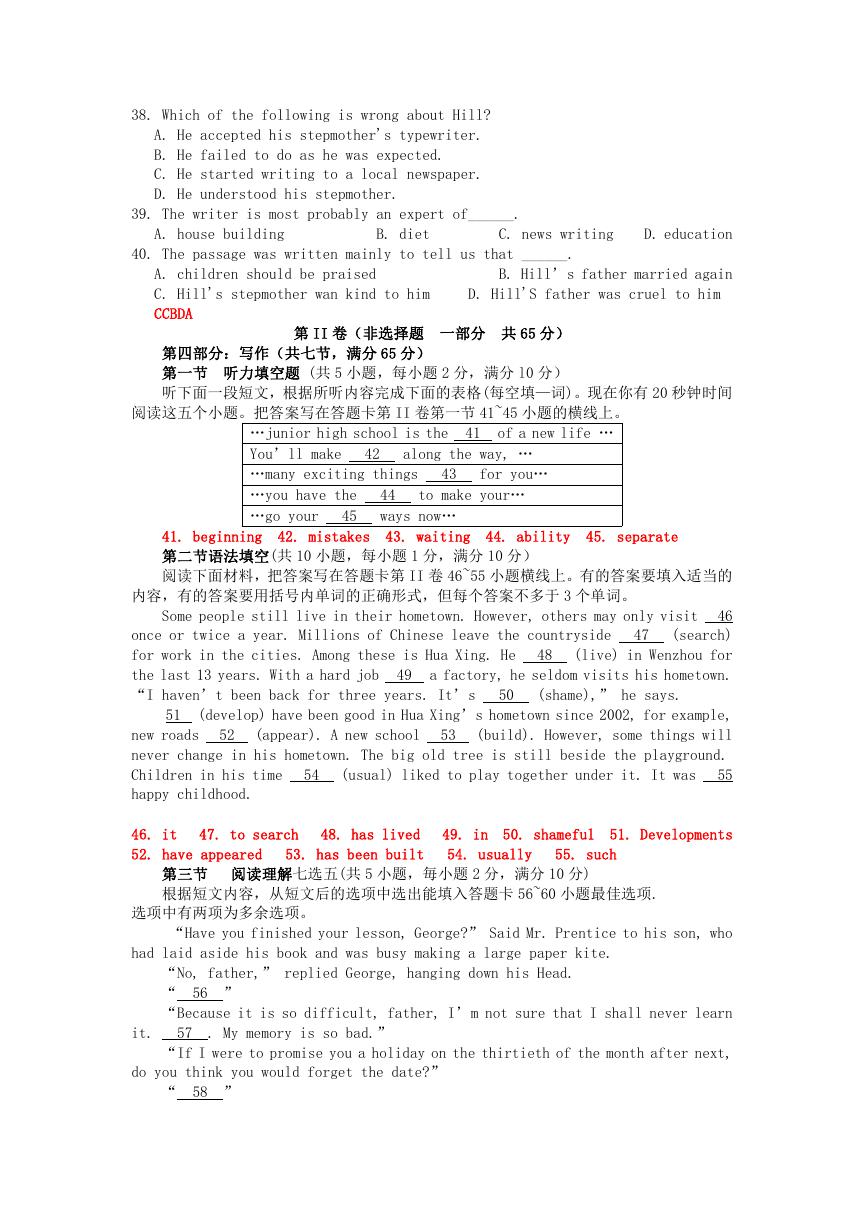
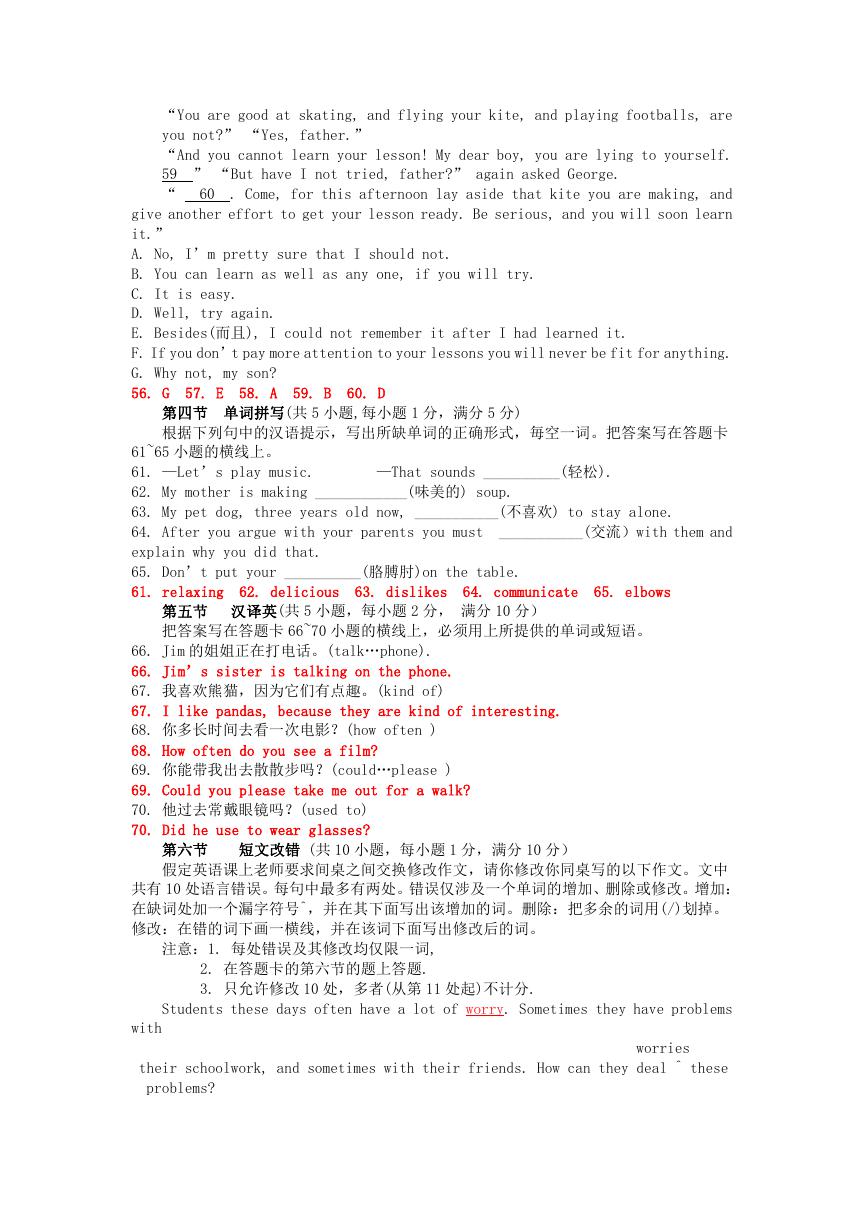
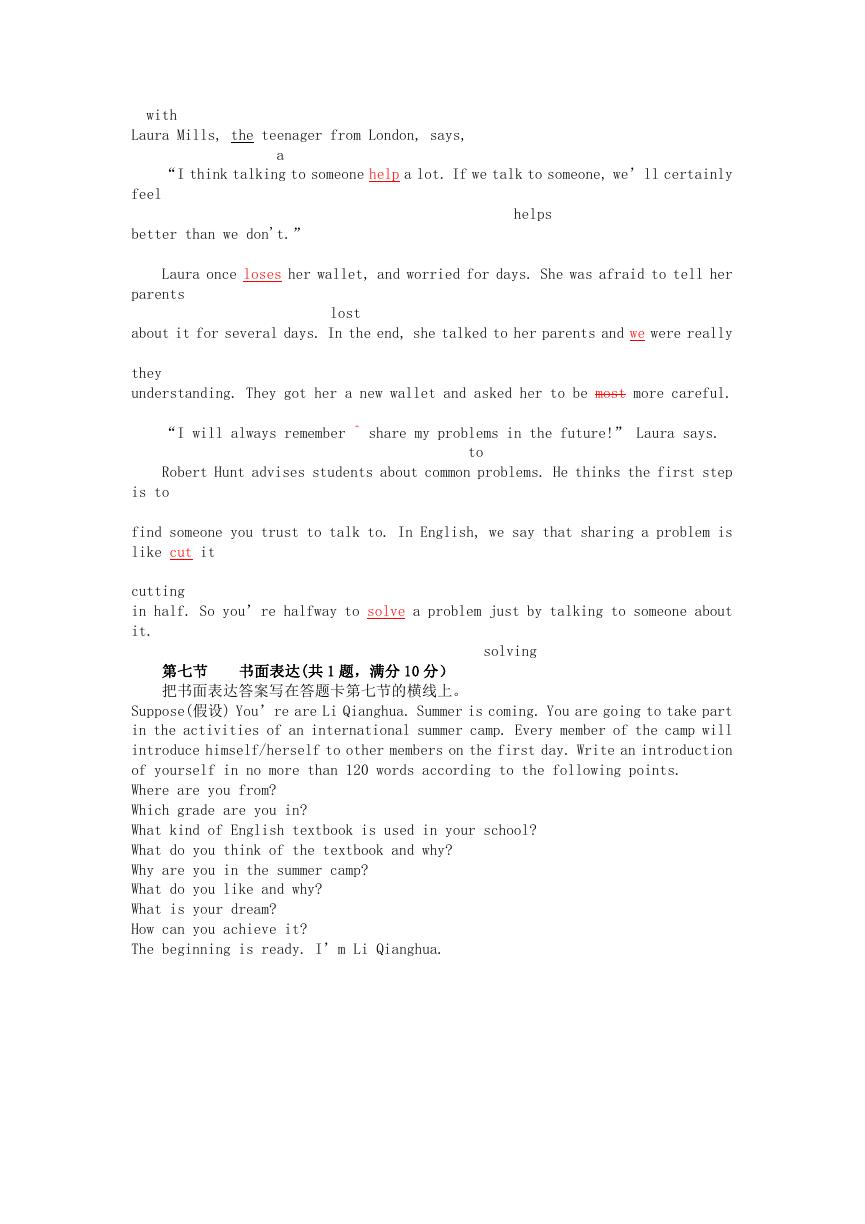







 2023年江西萍乡中考道德与法治真题及答案.doc
2023年江西萍乡中考道德与法治真题及答案.doc 2012年重庆南川中考生物真题及答案.doc
2012年重庆南川中考生物真题及答案.doc 2013年江西师范大学地理学综合及文艺理论基础考研真题.doc
2013年江西师范大学地理学综合及文艺理论基础考研真题.doc 2020年四川甘孜小升初语文真题及答案I卷.doc
2020年四川甘孜小升初语文真题及答案I卷.doc 2020年注册岩土工程师专业基础考试真题及答案.doc
2020年注册岩土工程师专业基础考试真题及答案.doc 2023-2024学年福建省厦门市九年级上学期数学月考试题及答案.doc
2023-2024学年福建省厦门市九年级上学期数学月考试题及答案.doc 2021-2022学年辽宁省沈阳市大东区九年级上学期语文期末试题及答案.doc
2021-2022学年辽宁省沈阳市大东区九年级上学期语文期末试题及答案.doc 2022-2023学年北京东城区初三第一学期物理期末试卷及答案.doc
2022-2023学年北京东城区初三第一学期物理期末试卷及答案.doc 2018上半年江西教师资格初中地理学科知识与教学能力真题及答案.doc
2018上半年江西教师资格初中地理学科知识与教学能力真题及答案.doc 2012年河北国家公务员申论考试真题及答案-省级.doc
2012年河北国家公务员申论考试真题及答案-省级.doc 2020-2021学年江苏省扬州市江都区邵樊片九年级上学期数学第一次质量检测试题及答案.doc
2020-2021学年江苏省扬州市江都区邵樊片九年级上学期数学第一次质量检测试题及答案.doc 2022下半年黑龙江教师资格证中学综合素质真题及答案.doc
2022下半年黑龙江教师资格证中学综合素质真题及答案.doc